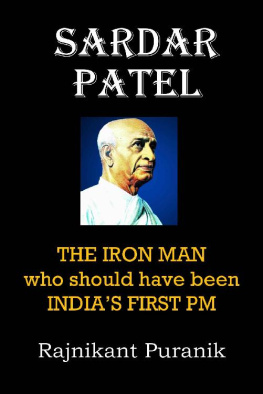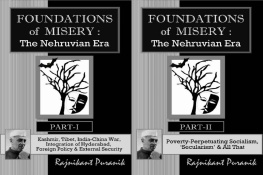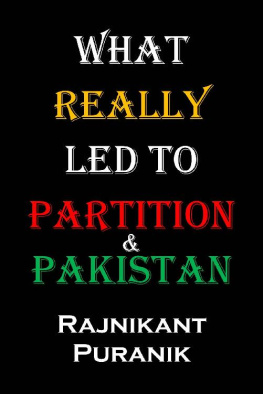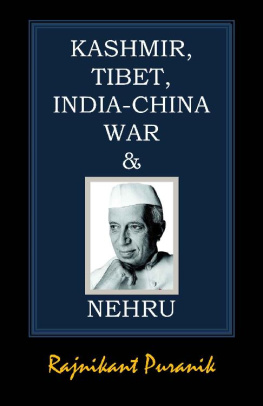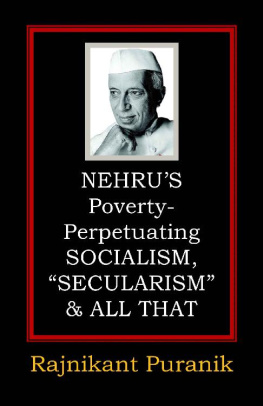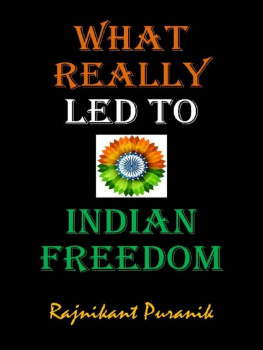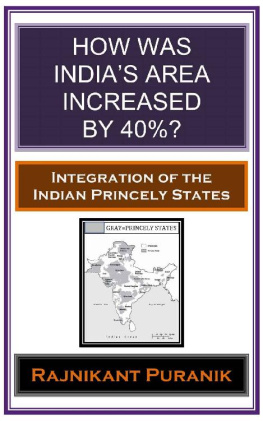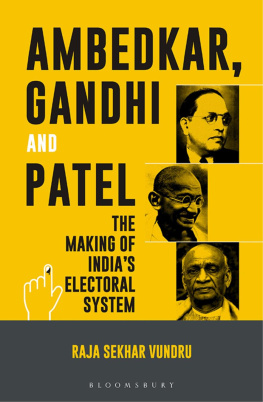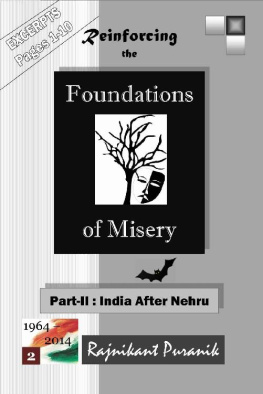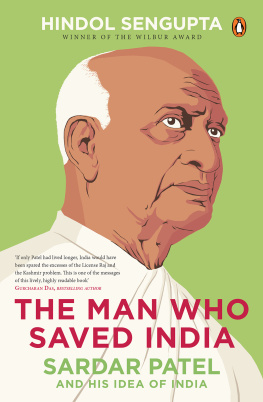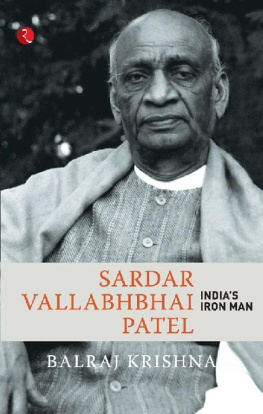Rajnikant Puranik - Sardar Patel: The Iron Man who should have been Indias First PM
Here you can read online Rajnikant Puranik - Sardar Patel: The Iron Man who should have been Indias First PM full text of the book (entire story) in english for free. Download pdf and epub, get meaning, cover and reviews about this ebook. year: 2018, genre: Politics. Description of the work, (preface) as well as reviews are available. Best literature library LitArk.com created for fans of good reading and offers a wide selection of genres:
Romance novel
Science fiction
Adventure
Detective
Science
History
Home and family
Prose
Art
Politics
Computer
Non-fiction
Religion
Business
Children
Humor
Choose a favorite category and find really read worthwhile books. Enjoy immersion in the world of imagination, feel the emotions of the characters or learn something new for yourself, make an fascinating discovery.
- Book:Sardar Patel: The Iron Man who should have been Indias First PM
- Author:
- Genre:
- Year:2018
- Rating:3 / 5
- Favourites:Add to favourites
- Your mark:
- 60
- 1
- 2
- 3
- 4
- 5
Sardar Patel: The Iron Man who should have been Indias First PM: summary, description and annotation
We offer to read an annotation, description, summary or preface (depends on what the author of the book "Sardar Patel: The Iron Man who should have been Indias First PM" wrote himself). If you haven't found the necessary information about the book — write in the comments, we will try to find it.
Rajnikant Puranik: author's other books
Who wrote Sardar Patel: The Iron Man who should have been Indias First PM? Find out the surname, the name of the author of the book and a list of all author's works by series.
Sardar Patel: The Iron Man who should have been Indias First PM — read online for free the complete book (whole text) full work
Below is the text of the book, divided by pages. System saving the place of the last page read, allows you to conveniently read the book "Sardar Patel: The Iron Man who should have been Indias First PM" online for free, without having to search again every time where you left off. Put a bookmark, and you can go to the page where you finished reading at any time.
Font size:
Interval:
Bookmark:
Sardar |
the Iron Man INDIAS FIRST PM |
Rajnikant Puranik
While I usually came back from meeting Gandhiji elated and inspired but always a bit sceptical, and from talks with Jawaharlal fired with emotional zeal but often confused and unconvinced, meetings with Vallabhbhai were a joy from which I returned with renewed confidence in the future of our country. I have often thought that if fate had decreed that he [Sardar Patel], instead of Jawaharlal, would be younger of the two, India would have followed a very different path and would be in better economic shape than it is today.
JRD Tata {BK2/v} {Lala/174}
Here was a man [Sardar Patel] with a crystal-clear mind who could see to the core of the problem within the shortest possible time
Frank Anthony {BK2/248}

the Iron Man
who should have been
INDIAS FIRST PM
by
Rajnikant Puranik
Patel possessed the organising ability of Bismarck, the astute statesmanship of Chanakya, and the single-minded devotion to the cause of national unity of Abraham Lincoln.
VV Giri, ex-President of India {BK/433}
Categories: Non-fiction, History, Biography
Copyright 2018 Rajnikant Puranik
This Print: June 2018
Digital & Print Edition available @Amazon
Print Edition for India available from www.pothi.com
Please check
www.rkpbooks.com
for all the books by the author,
for their details, and from where to procure them
All rights reserved. No part of this publication may be reproduced, distributed or transmitted in any form or by any means, whether electronic/digital or print or mechanical/physical, or stored in an information storage or retrieval system, without the prior written permission of the copyright owner, that is, the author, except as permitted by law. However, extracts up to a total of 1,000 words may be quoted without seeking any permission, but with due acknowledgement of the source. For permission, please write to .
Also by the Author
Please check
www.rkpbooks.com
for details, and from where to procure them
Foundations of Misery :
The Nehruvian Era 194764
Nehrus 97+ Major Blunders
Revealing Facts about India's Freedom Struggle
Notable Personalities & Interesting Timelines
India After Nehru
From Lal Bahadur Shastri to Narendra Modi.
(Its Kindle Edition is Titled:
Reinforcing the Foundations of Misery:
India After Nehru )
AAP & Kejriwal
Great Expectations or Irrational Expectations
Novel:
The Matheran Mystery
Software Books:
The Art of Creative Destruction
Illustrated Software Testing, Test Automation & Agile Testing
Maximum Oracle
Oracle Best Practices
To the fond memory of my late parents
Shrimati Shakuntala and
Shri Laxminarayan Puranik
___________________
Thanks to
Devbala Puranik, Manasi and Manini
for encouragement and support
A Note on Citations & Bibliography
Citations are given as super-scripts in the text, such as {Azad/128}.
Citation Syntax & Examples
{Source-Abbreviation/Page-Number}
e.g. {Azad/128} = Azad, Page 128
{Source-Abbreviation/Volume-Number/Page-Number}
e.g. {CWMG/V-58/221} = CWMG, Volume-58, Page 221
{Source-Abbreviation} for URLs (articles on the web), and for digital books (including Kindle-Books), that are searchable, where location or page-number may not be given.
e.g. {VPM2} , {URL15}
{Source-Abbreviation/Location-Number} for Kindle Books
e.g. {VPM2} , {VPM2/L-2901}
Example from Bibliography Table at the end of this Book
Azad | B | Maulana Abul Kalam Azad India Wins Freedom . Orient Longman. New Delhi. 2004 |
CWMG | D, W | Collected Works of Mahatma Gandhi. Vol. 1 to 98. http://gandhiserve.org/e/cwmg/cwmg.htm |
URL15 | U | Article Nehru vs Patel: Ideological Rift, Hardly a Trivial One. Rakesh Sinha, Sunday Express. 10-Nov-2013. www.pressreader.com/india/sunday-express8291/20131110/282033324959792 |
VPM2 | K, D | V.P. Menon The Transfer of Power in India . Orient Longman. Chennai. (1957) 1997. books.google.co.in/books?id=FY5gI7SGU20C |
The second column above gives the nature of the source : B=paper Book, D=Digital Book/eBook other than Kindle, K=Kindle eBook, U=URL of Document/Article on Web, W=Website, Y=YouTube.
Preface
The problem of the [Princely] states is so difficult
that only you can solve it.
Gandhi to Sardar Patel . {RG/406}
Sir Stafford Cripps had estimated it would take India 10 to 15 years or more, to merge the States with India. It was a surprise to all, and a tribute to the Sardars abilities, that he took, not 10 to 15 years, but less than 10 to 15 months to merge all the 548 Princely States with India, extending Indias geographical area by a whopping 40%.
__________________________________
It is not fully appreciated, but if one studies the unfolding pre-independence and the post-independence scenario between 1945 and 1950, and takes stock of the crucial period and the critical decisions taken, one has to acknowledge that it was not Gandhi or Nehru or any other leader but Sardar Patel who played an indispensably wise, critical, mature, decisive, responsible, steering leadership role. This book highlights that role. Sardar Patel boldly took upon himself the demanding and thankless task of critical and risky decision making that others were either too timid, or too uncertain, or too confused, or too cautious to take. It was he who took the lead in devising winning strategies and tactics post 1945.
Much earlier, at the beginning of his political career, he was the first leader who translated the Gandhian theory of non-violent, non-cooperation satyagraha into practice in the rural setting by successfully planning and leading the Bardoli Satyagraha of 1928.
It is not so well known that Sardar had excelled in academics. He completed the 36-month, 9-terms law course at the Middle Temple (one of the Inns of Court, as Londons law colleges were called then) in about two years obtaining first class with honours, getting first rank, and winning a prize of 50 pounds!
What is more he had self-financed his education in England through his law-practice in India, as his father was not in a position to support him. Through the dint of his labour and competence, he established a roaring law-practice upon return from England, which he gladly gave up upon a call from Gandhi. This was in sharp contrast to Nehru who with all the financial resources and facilities provided by his father had just scraped through in lower second division in England; and rather than being able to earn as a lawyer, despite his fathers established practice in Allahabad, had to remain financially dependent upon his father for himself and for his family.
India of today is what was British India after partition, plus additional 40% geographical area on account of the integration of 548 Princely States into it (out of 562, 14 went to Pakistan), which Britain had declared to be independent upon lapse of their paramountcy. The credit for expanding Indias area by a massive 40% goes to Sardar Patel. This book provides interesting details on that integration.
But for Sardar Patel Hyderabad would have been either another Pakistan or Kashmir. J&K would not have been a perennial problem as it has become, bleeding India profusely in terms of men, money and materials through the decades, and Kashmiri Pandits would not have seen the terrible days that they have, had Nehru allowed Sardar to handle J&K too, like he [Sardar] had successfully handled the integration of all the other Princely States. This book brings out all the critical details on both Hyderabad and Kashmir.
Font size:
Interval:
Bookmark:
Similar books «Sardar Patel: The Iron Man who should have been Indias First PM»
Look at similar books to Sardar Patel: The Iron Man who should have been Indias First PM. We have selected literature similar in name and meaning in the hope of providing readers with more options to find new, interesting, not yet read works.
Discussion, reviews of the book Sardar Patel: The Iron Man who should have been Indias First PM and just readers' own opinions. Leave your comments, write what you think about the work, its meaning or the main characters. Specify what exactly you liked and what you didn't like, and why you think so.

